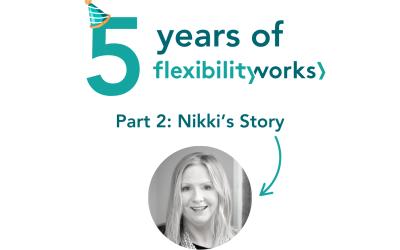By Nikki Slowey, Director and Co-founder, Flexibility Works
When we talk about reducing poverty through work, pay is rightly the first thing that comes to mind. A fair wage is vital for people and their families to afford life’s essentials.
But there’s another, often overlooked, part of the solution; flexible working – because of the way it enables people to get into work, and stay in work.
At Flexibility Works, we believe flexible working is good for people, good for employers, and good for society. And we believe it could be used far more effectively by governments and policy makers as a cost-effective, practical tool to help reduce poverty.
Flex helps people get into work
Our research with unemployed Scottish adults looking for work suggests nearly three in ten (28%) could work if only they could find a flexible role. What’s more, nearly one in seven (13%) Scottish workers say getting a flexible job provided the gateway they needed into employment. Yet according to Timewise, only a third of Scottish job adverts mention flexible working. And 28% of unemployed adults have turned down a job offer because the role didn’t offer the flexibility they needed.
Flex helps people stay in work
As well as helping people get into work, flexible working has a key role to play in enabling people to stay in work. Our research shows more than one in six (16%) flexible workers say they’d have to stop working altogether if their flexibility was no longer available. That rises to 26% of mothers and 30% of workers earning less than £20K.
Low pay, low flex
Unfortunately, workers on the lowest pay face a double setback. They are among the most likely to drop out of work if they can’t work flexibly. And yet they are also the least likely to work flexibly in the first place. Our research shows just over half (57%) of Scottish workers earning less than £20K a year work flexibly, compared with 80% of workers who earn more than £50K.
Of course, having a job doesn’t mean you’re immune to poverty. But a good job with fair pay certainly lowers your risk. Creating more flexible working, especially in lower paid roles would make work accessible and sustainable for more people.
Flex is good for business too
The good news is that flexible working isn’t just good for people, it’s proven to deliver significant benefits for businesses too. More than seven in ten Scottish employers in our research said flexible working had been positive for their organisation.
Employers told us the top business benefits of flexible working are:
- Retaining good staff (75%)
- Improved work life balance (75%)
- Reduced sickness absence (69%)
- Increased discretionary effort (68%)
How employers can explore more flex
Flexible working doesn’t need to feel like a revolution for employers. Often people only want small changes. One dad told us that starting and finishing 20 minutes earlier than usual meant he could pick his twin daughters up from school, saving hundreds of pounds a month in after school care.
We encourage all employers to talk to their teams about what would make a difference to them, and to be open-minded about solutions even if they seem, at first glance, too small to make a difference.
How governments and policy makers can leverage flex
While employment law is set by Westminster, the Scottish Government and other policy makers have real power to shape workplace culture and support employers here in Scotland. Here are three ways they could do it.
- Fund support for employers
The Scottish Government can fund awareness campaigns, training, and consultancy to help employers (especially SMEs that don’t have large HR departments) understand how flexible working can benefit their business and their people, especially in lower-paid roles.
- Rethink employability programmes
Scottish Government and employability providers can shift the focus from making people ‘fit’ inflexible jobs to helping employers create more flexible ones. This should include upskilling employability staff to ensure they are confident in their understanding of flexible working and advocating for it with employers.
- Make flex a requirement in grants and contracts
Scottish Government distributes millions of pounds in grant funding and via contracts. But the criteria for organisations applying for grant funding or contracts currently only that’s that flexible working is ‘desirable’. We’d like this made ‘mandatory’ for all organisations applying for Scottish Government and other public sector funding and contracts.
Poverty is a hugely complex issue, and greater flexible working certainly won’t solve it alone. But flexible working does help people get into work and stay in work. And it does help employers build stronger, more resilient teams. As part of Challenge Poverty Week, we want more people to recognise the role greater flexible working can and should play in efforts to reduce poverty in Scotland.




